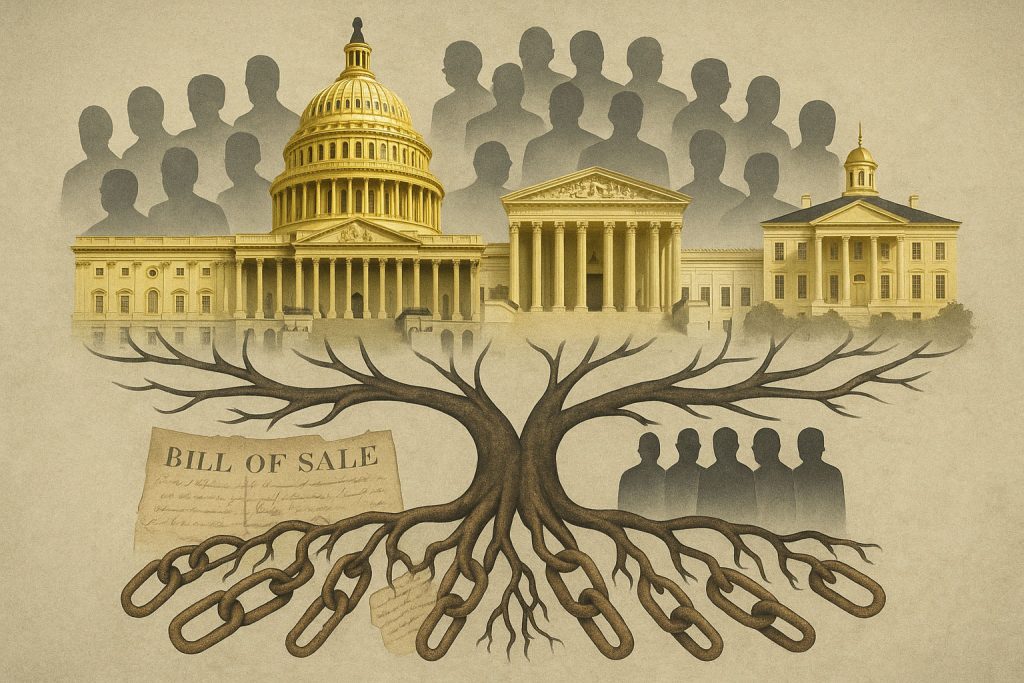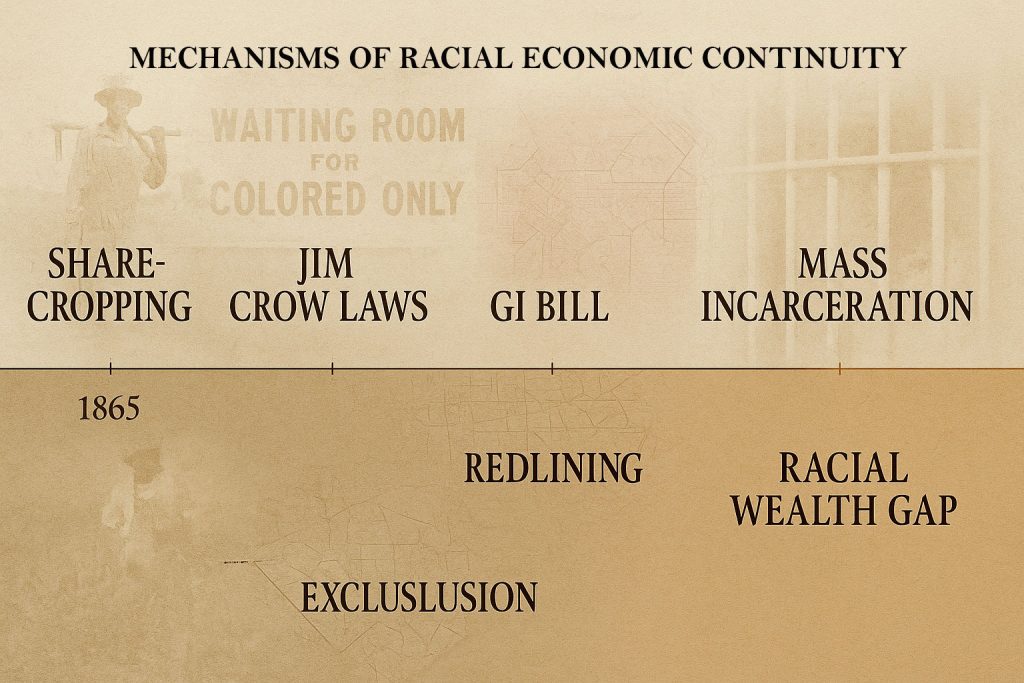From InnerKwest’s Bloodlines & Power Series | August 9, 2025
A 2023 Reuters investigation found at least 119 of America’s most influential leaders—presidents, governors, members of Congress, and Supreme Court justices—descend from people who enslaved Black Americans. What that means for power, policy, and repair today.
Introduction
American power didn’t just survive slavery—it inherited it. In 2023, Reuters published a sweeping, document-driven series mapping how today’s political elites—across parties and branches—descend from slaveholding families. The findings cut through myth and sentiment, forcing a present-tense question: when wealth, land, and status flowed from bondage, what obligations flow back?
What Reuters Found — In Brief
- Scale: Reuters identified 119 influential U.S. leaders with slaveholding ancestors, including members of Congress, living presidents, governors, and two sitting Supreme Court justices.
- Congressional share: Roughly a fifth of the 117th Congress had such lineage: 77 Republicans, 22 Democrats, 1 Independent.
- Presidents: Joe Biden and every other living former president except Donald Trump (whose ancestors arrived after abolition) have slaveholding forebears.
- Justices: Follow-on coverage identifies Amy Coney Barrett and Neil Gorsuch among the justices with slaveholding ancestry. Reuters itself confirmed “two justices” in its reporting.
- Public reaction: A Reuters/Ipsos poll found 23% of Americans said they’d be less likely to vote for a candidate with slaveholding ancestry. Among white respondents who know they have such ancestry, support for reparations was higher than peers.
Methodology Matters
Reuters’ investigative team built family trees, reviewed wills, bills of sale, probate files, tax rolls, and census schedules, then contacted each leader for comment. None disputed having at least one slaveholding ancestor. This level of rigor is essential in a debate too often derailed by rumor.
Names, Offices, and Parties
The pattern isn’t blue or red—it’s American. The Reuters dataset spans Biden and other living presidents (except Trump), senior senators such as Mitch McConnell and Lindsey Graham, governors, and state leaders.
This is not about “ancestry guilt.” It’s about institutional continuity: wealth, land access, elite schooling, and political entrée compound across generations.

From Emancipation to Re-ascendance
Another Reuters feature traced how certain slaveholding families reasserted wealth and status after the Civil War—pivoting to sharecropping, debt peonage, and legal regimes that preserved racial hierarchy. These mechanisms carried forward the economic benefits of slavery well into the 20th century.

“They Never Gave Back a Cent”?
While not all families refused restitution outright, Reuters documented the ancestry and showed how power persisted. On policy, Reuters outlined where leaders stand on reparations and the racial wealth gap—revealing a mix of resistance and guarded openness, but no broad, coordinated “give-back.”
Why It Still Matters
- Policy Consequences: Lawmakers with inherited advantages shape positions on voting rights, housing, education, criminal justice, and reparations—areas where historic extraction created present disparities.
- Wealth Transmission: Land, capital, and social networks from slaveholding lineages still influence who gets internships, donors, clerkships, and committee gavels.
- Public Mandate: Voters are signaling that ancestry can influence trust and support for repair.
Case Studies to Watch
- Federal Judiciary: Examine jurisprudence on affirmative action, voting rights, and executive power alongside the documented ancestries of sitting justices.
- Senate Leadership: Review how figures like McConnell and Graham have legislated in areas linked to race and economic equity.
- Executive Branch: Contextualize Biden’s equity agenda against the backdrop of his documented lineage.
What “Repair” Could Look Like
- Disclosure Norms: Require voluntary disclosure of heritage when voting on reparations or land claims, similar to financial disclosure rules.
- Targeted Restitution: Fund Black land retention, heirs’ property reform, and down-payment assistance in counties tied to slaveholding lineage.
- Data Infrastructure: Digitize local archives—wills, manumission papers, tax rolls—to enable public access to historical records.
- Institutional Give-Back: Encourage scholarships, endowed chairs, and procurement set-asides from institutions founded or funded by slaveholding families.
Counterarguments
Critics say ancestry should not determine legitimacy or liability, as today’s leaders did not personally commit the crimes. The counterpoint is not about collective guilt—it’s about collective accounting. If state and private fortunes were built by extracting life and labor, then the state can repair harm with race-conscious policy aimed at closing documented gaps.
“Power didn’t just survive slavery—it inherited it.”
“A fifth of the 117th Congress descends from slaveholders.”
Closing
This isn’t about punishing the children for the sins of the parents. It’s about recognizing the systems that were built with stolen labor, understanding how those systems persist, and deciding what repair looks like in an America where the past is still walking the halls of power.
Support InnerKwest: Powering Truth & Excellence with Bitcoin
At InnerKwest.com, we are committed to delivering impactful journalism, deep insights, and fearless social commentary. Your Bitcoin contributions help us execute with excellence, ensuring we remain independent and continue to amplify voices that matter.
Support our mission—send BTC today!
🔗 Bitcoin Address: 3NM7AAdxxaJ7jUhZ2nyfgcheWkrquvCzRm© 2026 InnerKwest®. All Rights Reserved | Haki zote zimehifadhiwa | 版权所有.
InnerKwest® is a registered trademark of Inputit™ Platforms Inc. Global
No part of this publication may be reproduced, distributed, or transmitted in any form or by any means without prior written permission. Unauthorized use is strictly prohibited.
Thank you for standing with us in pursuit of truth and progress!![]()


